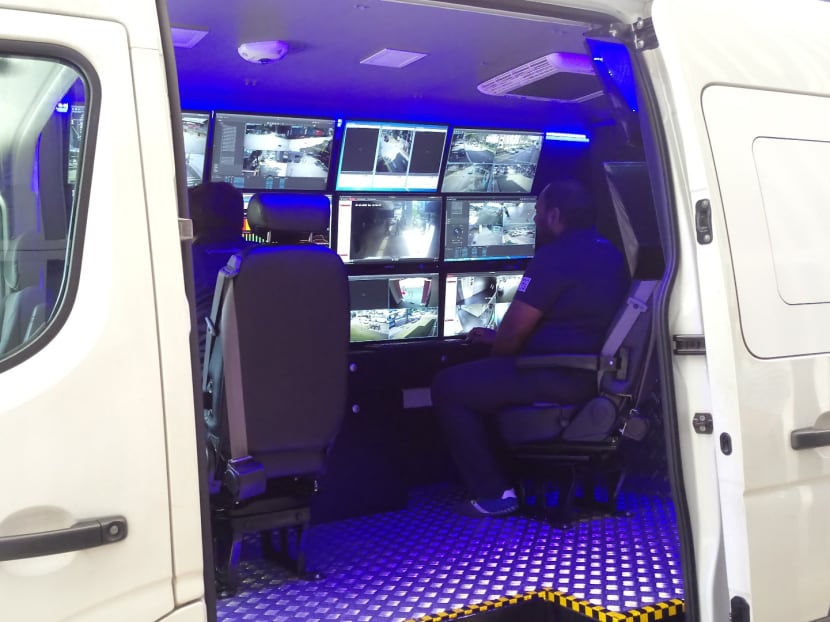Technology key to improving job satisfaction, say security officers
SINGAPORE — For the bulk of his last three years in the security industry, Mr Eric Holmberg spent up to 11 hours a day staring at footage from 50 closed-circuit cameras at a guard post, often dozing off due to boredom.

Concorde Security's mobile command centre is a vehicle equipped with surveillance features that reduces dependence on manpower. Photo: Kelly Ng/TODAY
SINGAPORE — For the bulk of his last three years in the security industry, Mr Eric Holmberg spent up to 11 hours a day staring at footage from 50 closed-circuit cameras at a guard post, often dozing off due to boredom.
“I often have nothing to do, just staring at cameras (but) there is nothing much to see… It’s actually quite a boring job (with) very little movement, and we are rooted to the guard post,” said the 50-year-old, who was then deployed as a “static” security guard.
Mr Holmberg is one of 47,000 security officers here hired to detect and deter potential threats at their assigned premises, but like many in his profession, he faces the challenge of feeling under-utilised at work.
Luckily for him, his work situation improved six months ago after he joined Concorde Security’s “I-Guarding” team. The job involves conducting patrols from a mobile command and control centre, which is a vehicle equipped with surveillance and monitoring features to help officers respond rapidly to incidents across a wider cluster of buildings.
The current role allows him to be more engaged and makes him feel more “useful”, he said.
Together with a driver and a technician, Mr Holmberg roves across a network of 25 buildings in a typical night. He is also required to patrol on foot to check that sites are properly gated and their intercom systems are not tampered with.
“I have more to offer in this job… It is much more interesting, I feel like a private investigator sometimes,” he added.
With the help of technology, systems like Concorde Security’s mobile control centre not only help to redesign security roles, but also cut down officers’ working hours.
While he was previously pulling in 12-hour shifts, Mr Holmberg now works for about eight hours a day.
Ms Ahsotha Kunasingam, who works as a security officer at a condominium, said that much of her job involves administrative tasks such as manually jotting down visitors’ particulars, processing passes for contractors and issuing parking tickets.
“If technology improves and we can just scan visitor’s identity cards and let them in, it will help reduce manpower,” said Ms Kunasingam, who works for security firm Twinrock Global.
Technology and innovation is one of four areas that the Government will focus on in its blueprint to transform the security industry. The plan was unveiled by the Ministry of Home Affairs at the launch of the security industry transformation map on Tuesday (Feb 13).
While the push on this front is not new, security agencies told TODAY that getting buyers of security services on board has been an uphill task.
“Many people still want to see a human there… It has been difficult to get (buyers) to understand that right technology is the way to go,” said Mr Kelvin Goh, general manager at private security firm Soverus.
“Some people are concerned about having a guard to buy him lunch.”
Robots can easily take on the role of physical guards, especially at premises where human traffic is negligible, such as industrial sites at night, he added.
Local tech start-up Vi Dimensions, for instance, offers a “smart surveillance system” that is able to analyse vast amounts of real-time video data for abnormal behaviours and events. Unlike conventional methods, the smart system does not require human intervention — it sends an alert to officers when it detects any abnormal or suspicious behaviour.
However, Mr Toby Koh, group managing director at Ademco Security Group, cautioned that service buyers are still resistant to stepping out of their “comfort zones”.
He said: “Monitoring the situation remotely allows us to perform a risk assessment immediately and call on the police when necessary. But the mindsets of buyers and users are still not evolving fast enough.”
Mr Koh also stressed that technology must be customised based on each premises' assessment of risks and desired outcomes. He added: “Artificial intelligence and machine learning may be buzzwords, but we need to really understand how to best apply them in each situation. Otherwise, they will remain white elephants.”









